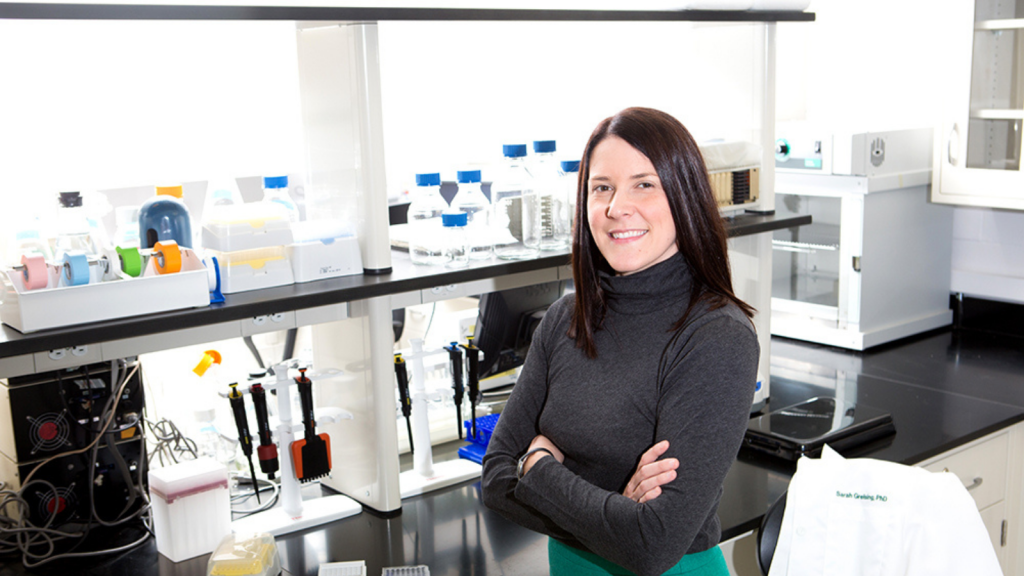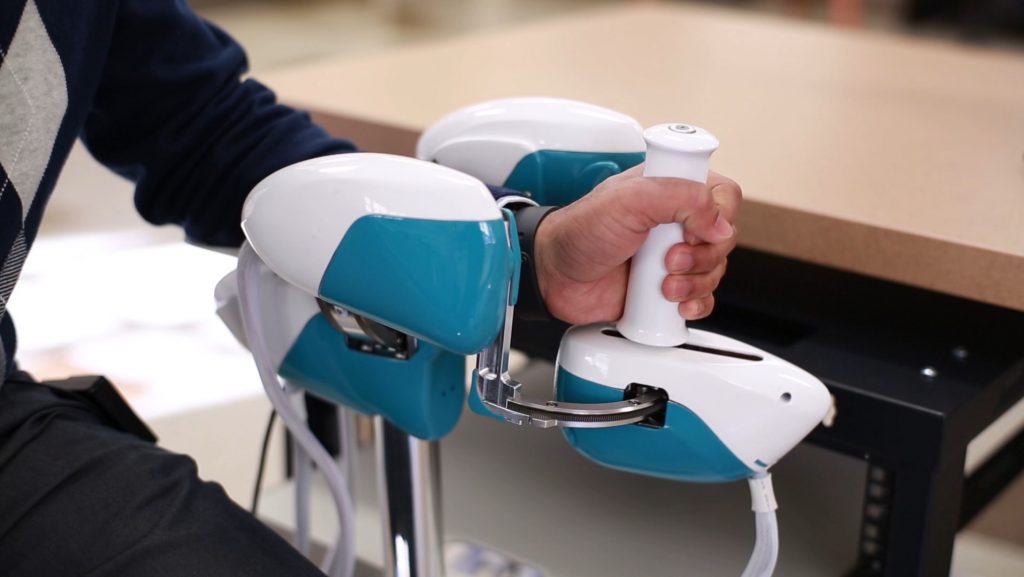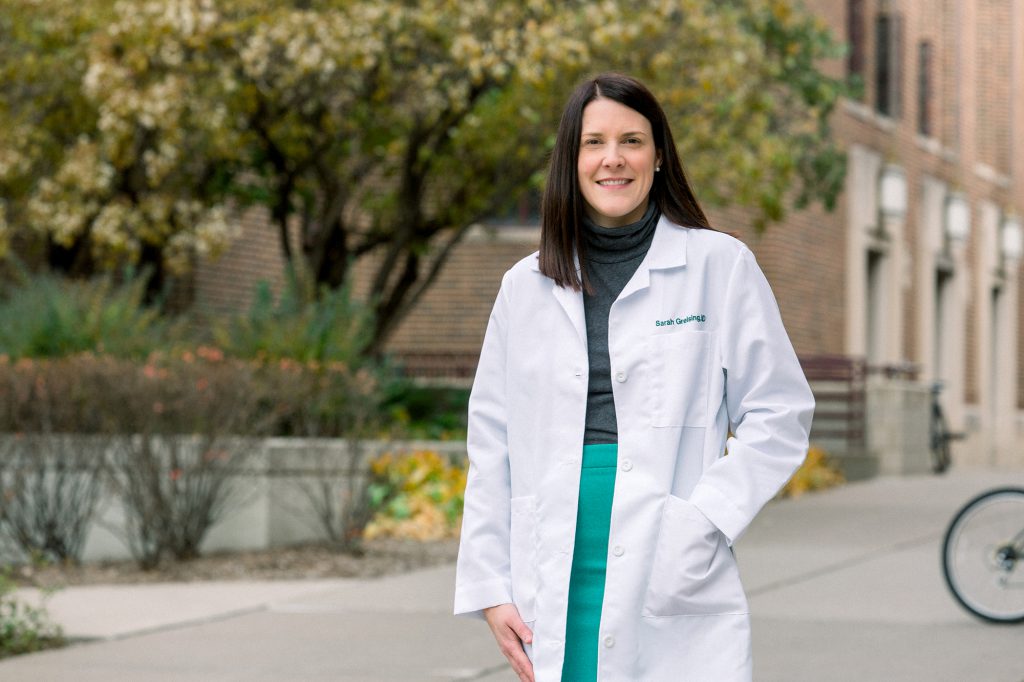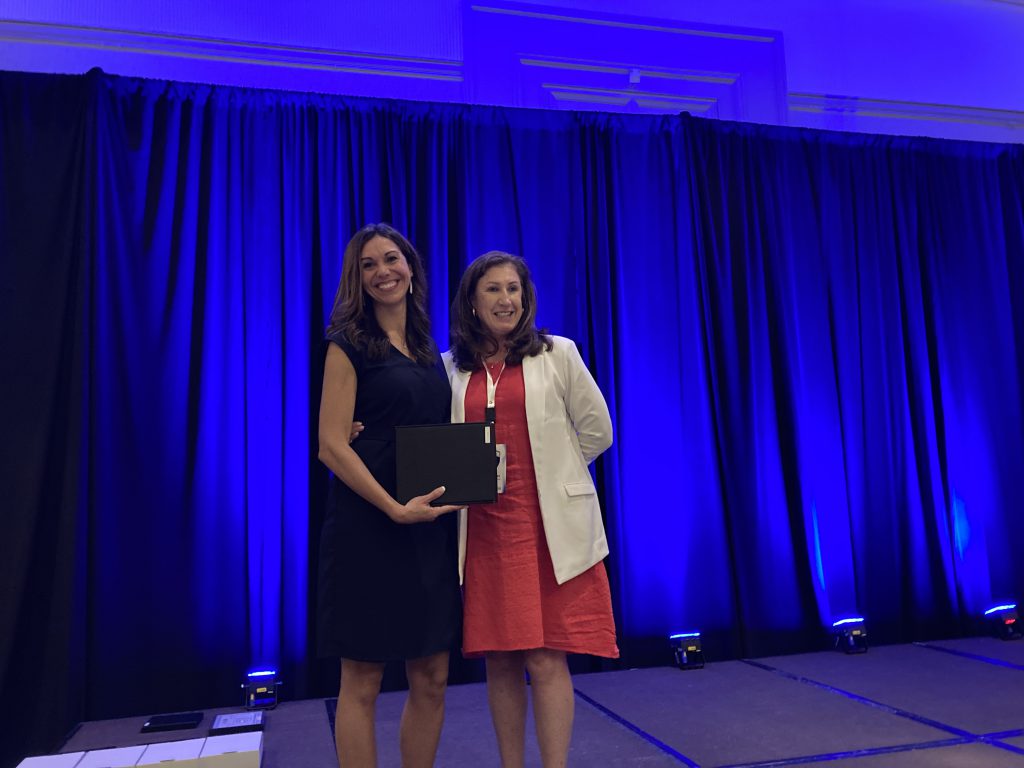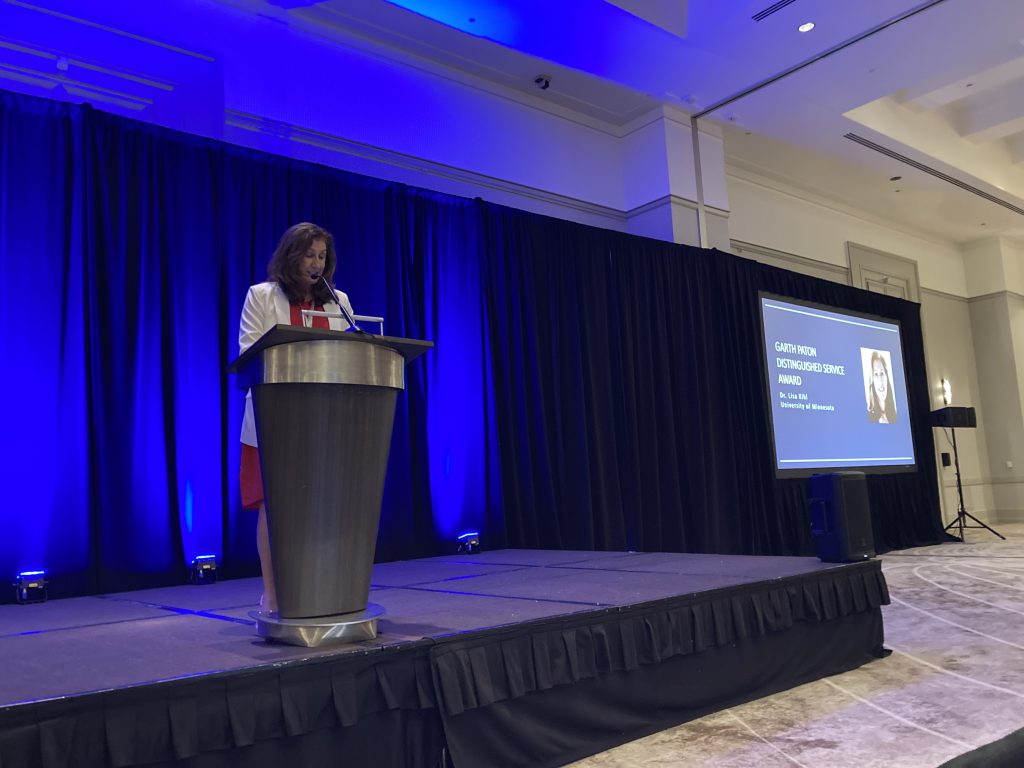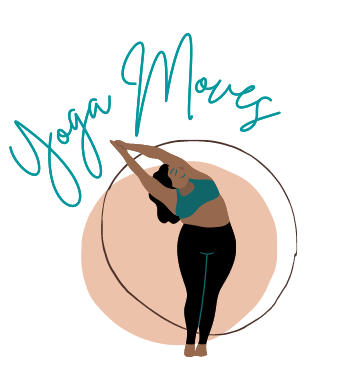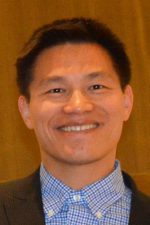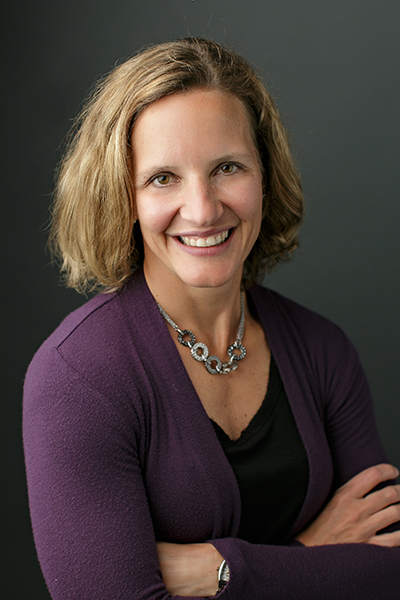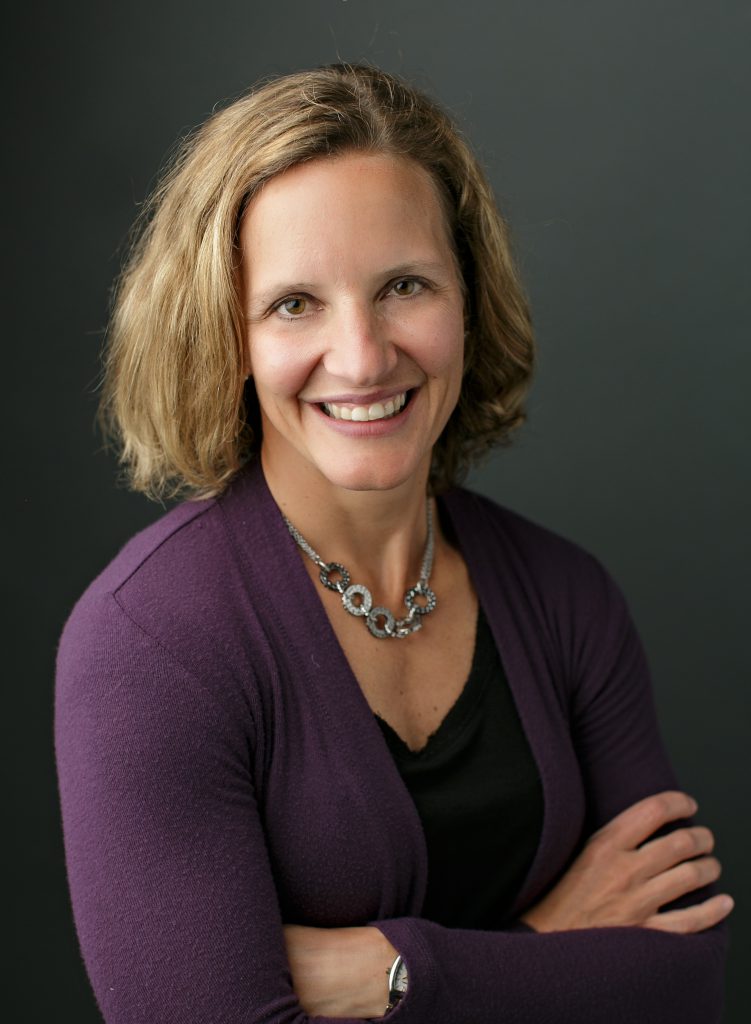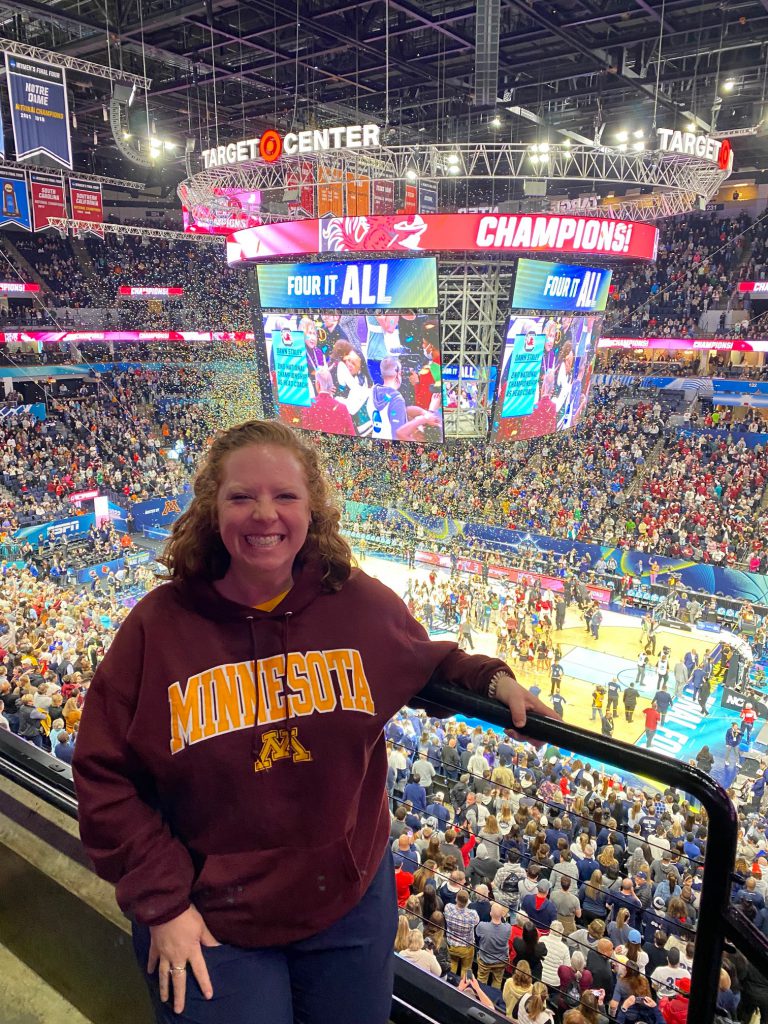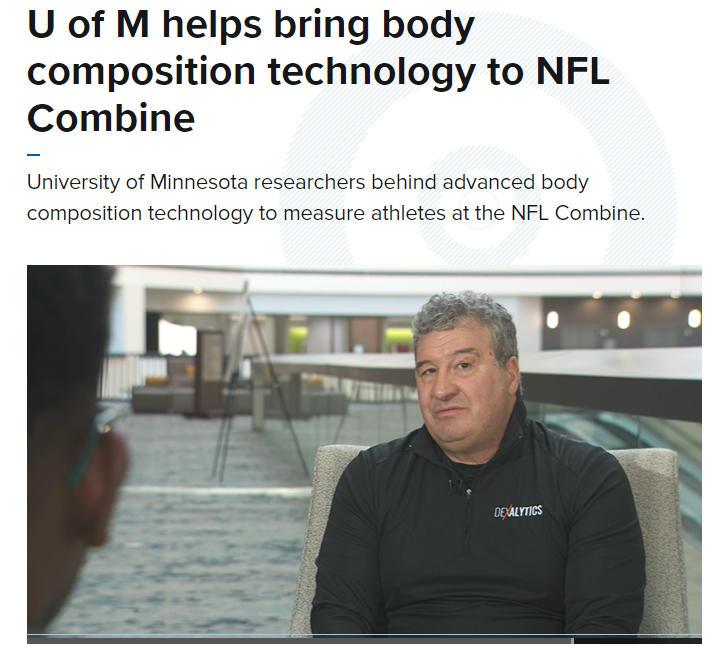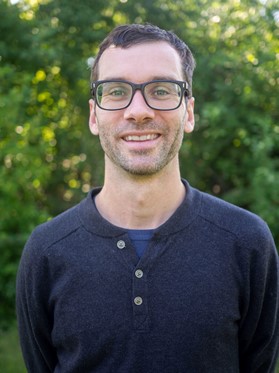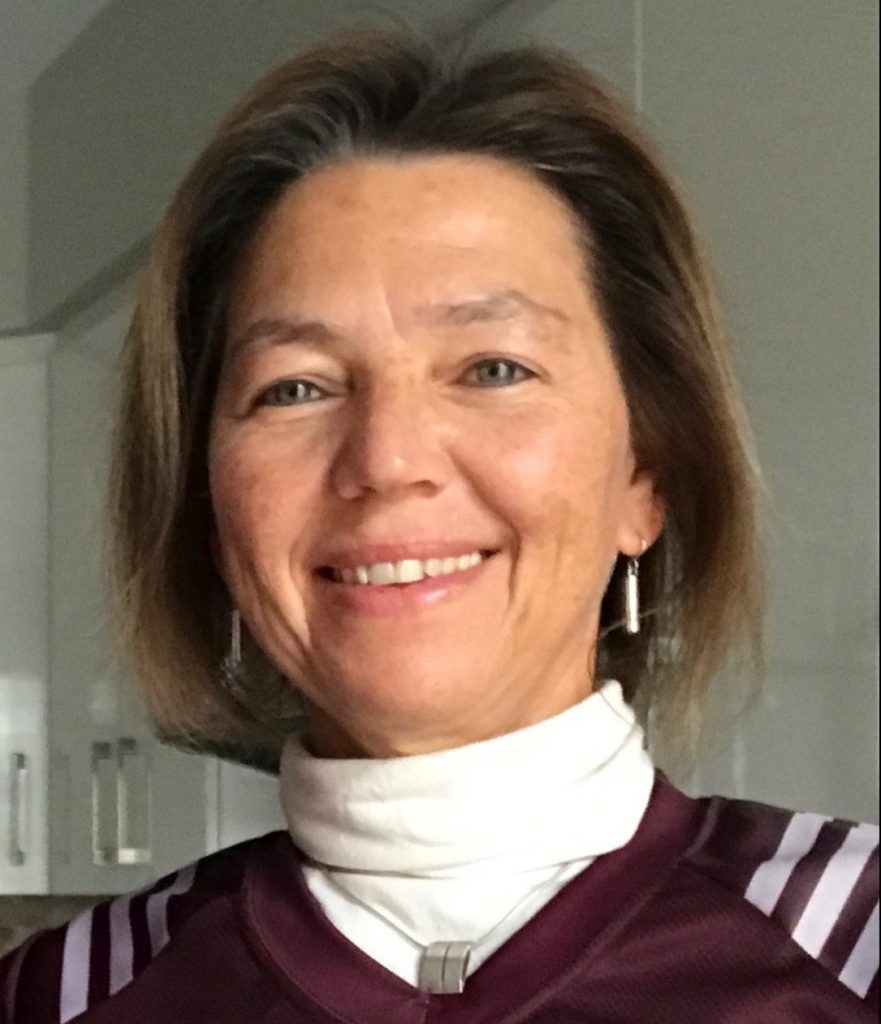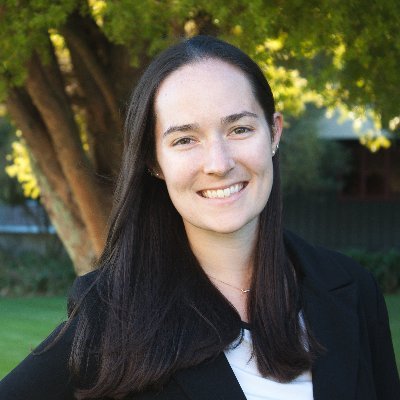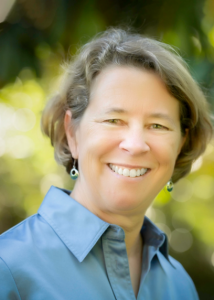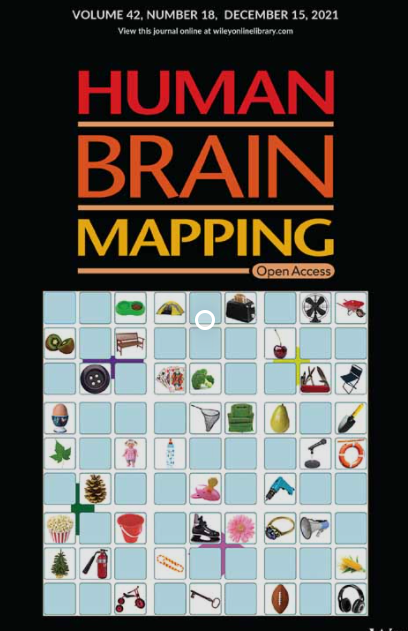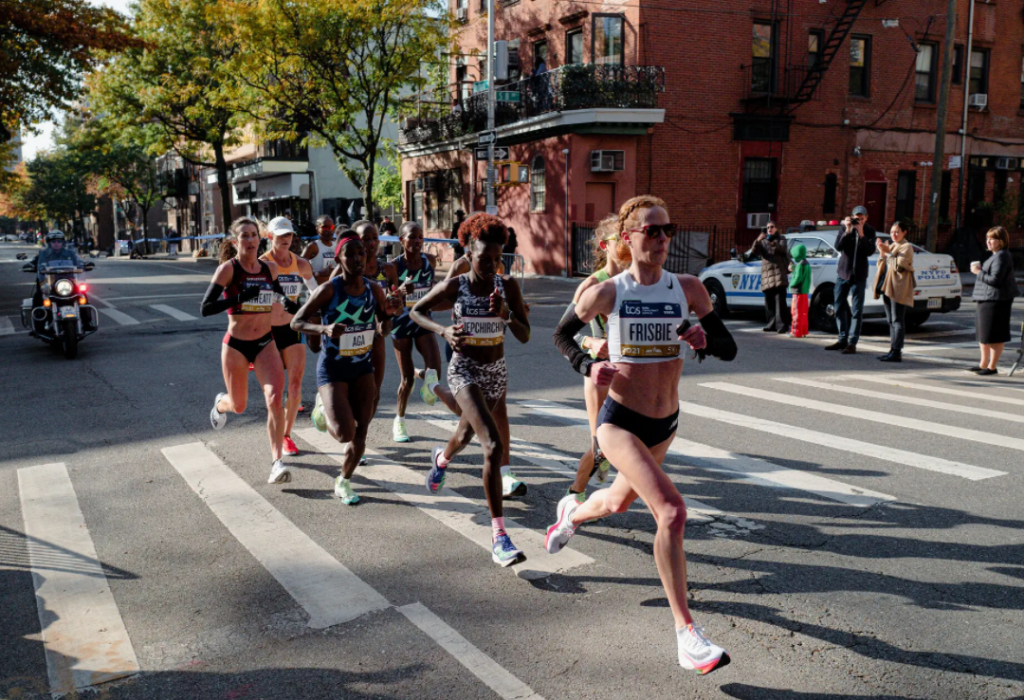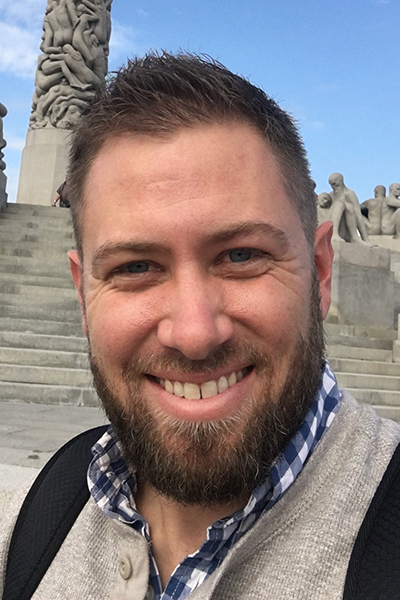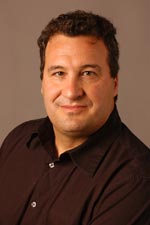Sarah M. Greising, PhD, associate professor in the School of Kinesiology and director of the Skeletal Muscle Plasticity and Regeneration Laboratory (SMPRL), presented at the FASEB Skeletal Muscle Stem Cells and Regeneration Conference in New Orleans, Louisiana July 24–29, 2022. Greising was invited to present a talk entitled “Mitochondrial dysfunction and associated whole-body metabolism in an injury that lacks regeneration” at the conference within the Muscle Stem Cell Niche and Cell Signaling session. The conference aims to accelerate the translation of fundamental advances into novel clinical treatments through the interactions of basic and clinical researchers. It provides opportunities for interaction and mentoring between junior scientists and senior investigators to foster career development.
Human Sensorimotor Control Lab receives National Science Foundation Award
The Partnership for Innovation program of the National Science Foundation has awarded a $49,950 grant to the Human Sensorimotor Control Laboratory (HSCL), a School of Kinesiology affiliate. The grant will cover allowable patent expenses (APEX) related to the research and development of the lab’s wristbot technology. Jürgen Konczak, PhD, director of the HSCL, is the principal investigator of this award, which supplements a current award that seeks to mature this robotic technology for future clinical use.
A dominant force: Kinesiology student named top player in women’s college hockey
Growing up in a family of basketball players, Taylor Heise nevertheless felt drawn to hockey from an early age. “I was given a flyer in 1st grade about trying hockey for free with the Minnesota Wild. I gave it to my parents and told them it was something I wanted to do. They kinda laughed.”
Her first foray into the sport quickly grew into a passion as her natural talent emerged. By 7th grade she had joined the varsity team at Red Wing High School, 30 minutes from her hometown of Lake City, Minnesota. She was named USA Today’s national Player of the Year, as well as Minnesota’s Miss Hockey, her senior year of high school in 2018.
Heise says she was immediately drawn to the School of Kinesiology, having been interested in a career as a physical therapist or athletic trainer for years. She graduated with a BS degree in Kinesiology in May 2022 and plans to continue her education with a Sport Management MEd, while playing her COVID year for the Gophers, next fall. She ultimately hopes to continue to play in the USA hockey circuit or play professionally. For now, she’s keeping her options open.
When it came time to choose a college, Heise’s decision was guided, in part, by advice from her mom. “My mom put into my mind that I should choose a school I would be happy with, even if I were injured. The University of Minnesota has a wonderful hockey program and it’s also a great school. I met the team, the coaches, and watched how they play—I’ve never regretted my decision a day in my life.”
“The more options you have, the more ways your life can go. I’m a firm believer that God puts you in the places you need to be in the places in the right times, with the right people – you want more options than one than just one.”
In March, Heise was named the 2022 Patty Kazmaier Award winner. The award is named in honor of the late Kazmaier, a hockey great and All-Ivy League defenseman at Princeton University in the 1980s, Kazmaier passed away in 1990, at only 28 years old. Heise is one of just three Gophers to win the prestigious award, which recognizes the best women’s hockey player in the U.S.
“I give a lot of props to my teammates, coaches, advisor, and classmates, for helping me succeed both athletically and academically,” she says.
“Trying something new is scary,” says Heise of her hockey journey. “It’s well worth it into the future, and if you put your time and energy into it, it’s one of the most rewarding things ever.”
Editor’s note: Congratulations, Taylor! We’re excited to see what the future holds for you

Greising publishes in Frontiers in Genetics
Sarah M. Greising, PhD, associate professor in the School of Kinesiology and director of the Skeletal Muscle Plasticity and Regeneration Laboratory (SMPRL), recently published a mini-review entitled, “Human muscle in gene edited pigs for treatment of volumetric muscle loss“ in the journal Frontiers in Genetics. The review, part of a special collection on Genetic Engineering in Farm Animals, provides insight on the potential of a novel treatment option using gene edited pigs as a platform to overcome the clinical challenges and limitations in the field for complex skeletal muscle traumas. The collaborative work is co-authored by colleagues at the University of Minnesota (Mary Garry, PhD, and Daniel Garry, MD, PhD) and colleagues at Columbia University (Joshua Weiner, MD, and David Sachs, MD).
Kihl awarded Garth Paton Distinguished Service Award from NASSM
Lisa Kihl, PhD, associate professor of sport management in the School of Kinesiology, was awarded the Garth Paton Distinguished Service Award at the North American Society for Sport Management (NASSM) annual conference, held June 1-4, 2022 in Atlanta, Georgia.
The prestigious award recognizes Kihl’s roles as an academic reviewer and editorial board member for the NASSM official research journal, Journal of Sport Management, her leadership roles on the NASSM executive board, and her mentorship of NASSM sport management students. All told, Kihl has served in 10 different capacities within NASSM since 2000.
In addition to Kihl’s leadership within NASSM, she is director of the Global Institute for Responsible Sport Organizations (GIRSO) in the School of Kinesiology, a global entity that partners with sport organizations to spearhead socially responsible initiatives. As part of this work, Kihl heads up the annual Social Innovation in Sport Competition, which pairs students with a sport organization to address a social priority in their community. To learn more, visit the GIRSO website.
YogaMoves study featured on WCCO-TV
WCCO-TV recently featured a Behavioral Physical Activity Laboratory (BPAL) study, called YogaMoves, in a segment, “UMN Kinesiology Study Hopes To Draw More Black Women To Yoga And Movement.” The piece highlighted the need for additional participants and efforts to draw women of color, particularly women who identify as African-American or Black, to experience the physical and mental health benefits of practicing yoga. Daheia Barr-Anderson, PhD, School of Kinesiology associate professor and BPAL director, was interviewed for the segment.
Gao co-authors blog on integration of eastern mindfulness movements into exercise
Zan Gao, PhD, professor and Director of Physical Activity and Epidemiology Laboratory in the School of Kinesiology, has co-authored an article for the American College of Sports Medicine blog entitled Integrating Eastern Mindfulness Movements into Exercise Routines in the Era of the Pandemic.
As Gao and co-author Yingying Chen, DNP, RN, note in the piece, May is both Mental Health Awareness Month and Asian American and Pacific Islander Heritage Month, an ideal time to discuss the benefits of integrating Eastern mindfulness movements (e.g., tai chi, qigong, and yoga) into exercise routines to improve mental health and manage symptoms of depression. These types of exercises, while always beneficial, have become particularly relevant during the pandemic when depression and anxiety has become an increased concern.
Gao and Chen specifically highlight tai chi, a form of mind-body exercise that originated in China, as one example of Eastern mindfulness movements with both physical and mental health benefits:
“Research evidence suggests tai chi programs have positive effects on individuals’ immune systems, inflammation reduction, rehabilitation in respiratory diseases and emotional improvement. Also, practicing tai chi requires limited space and no extra equipment, so it can be practiced at home or in a nearby park, making it possible for us to maintain an active lifestyle during the pandemic and cope with COVID-19 adversities.”
The piece also notes the emergence and growth of virtual reality and gaming in broadening the availability of Eastern mindfulness movement exercises, citing games such as Guided Tai Chi (Oculus Quest 2) and Tai Chi for Beginners (Xbox) as options for individuals interested in exploring tai chi from the comfort of home.
School of Kinesiology celebrates Commencement
Accolades, cheers and congratulations were in order on Friday, May 13, 2022, when more than 200 School of Kinesiology students participated in the College of Education and Human Development (CEHD) Commencement at 3M Arena at Mariucci. Two separate ceremonies were held for undergraduate and graduate students. Students representing the classes of 2019, 2020, and 2021 joined 2022 graduates at the ceremonies, held in-person for the first time in three years. “KIN-gratulations” and best wishes to our graduates!
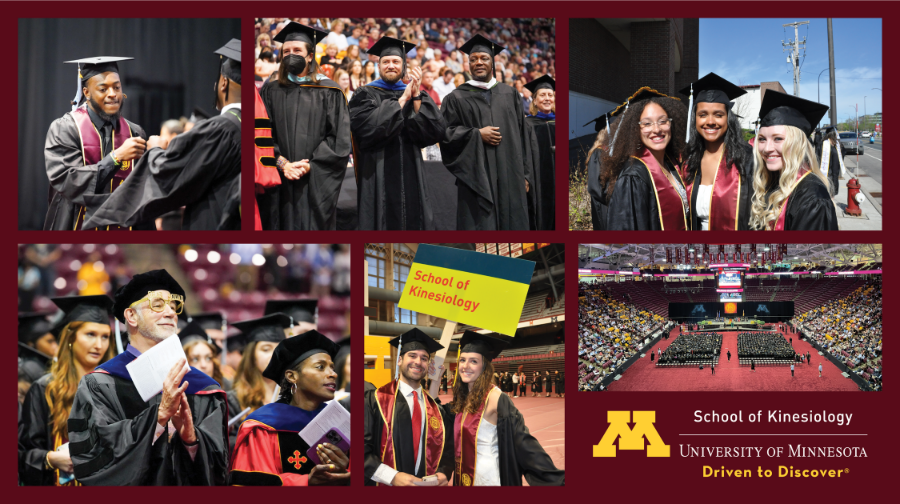
Lewis elected to Faculty Consultative Committee
Dr. Beth Lewis, Professor and Director of the School of Kinesiology, has been elected to a 3-year term on the Faculty Consultative Committee beginning July 1, 2022. As part of the committee, Lewis will collaborate with faculty representatives across the University, serving as the consulting body to the president and as executive committee of the Faculty Senate. “I am very excited for this opportunity and am looking forward to representing the faculty and serving the University in this capacity,” says Lewis.
After Two-Year COVID Hiatus, Women Coaches Symposium Returns in Full Force
The annual Women Coaches Symposium, hosted by the School of Kinesiology’s affiliated Tucker Center for Research on Girls & Women in Sport, was held Friday, April 22 at Huntington Bank Stadium.
The daylong event, canceled the last two years due to the COVID pandemic, welcomed more than 200 attendees from around Minnesota and the U.S., including Paralympic gold medalist and World Champion gold medalist Stephanie Wheeler as the Jean K. Freeman keynote speaker and Jen Fry, CEO of social justice firm JenFryTalks, LLC, as the Diversity, Equity & Inclusion keynote speaker. Click here for a full list of speakers, all who have made significant contributions to community-building, professional advancement, and advocacy for women coaches.
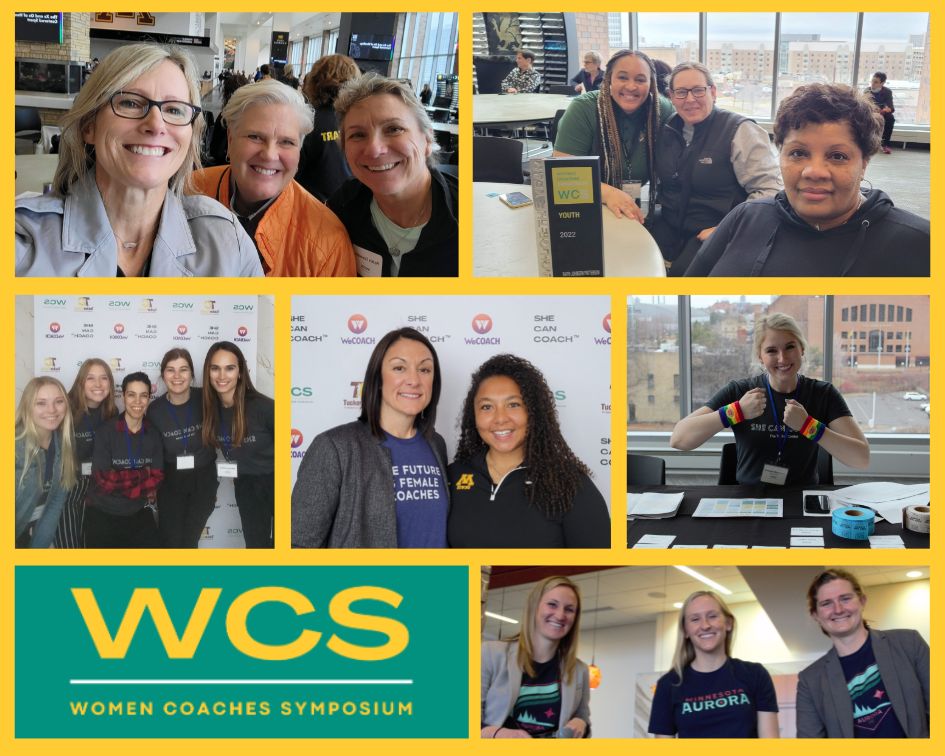
Other highlights of the day included a morning yoga session and the launch of the Take a Student to Lunch Program, a unique networking opportunity for students and coaches. Recipients of the 2022 Coach of the Year Awards were also announced:
- Youth/High School: Faith Johnson Patterson, Head Girls’ Basketball Coach, Visitation School
- Collegiate: Kristin Stets, Retired Assistant Women’s Tennis Coach, St. Olaf College
- High Performance: Cheryl Reeve, Head Basketball Coach, Minnesota Lynx
“The Women Coaches Symposium has become a literal game-changer for women coaches nationwide,” says Tucker Center director Dr. Nicole M. LaVoi. “Through our research, community education and outreach, and our advocacy, we’re supporting women coaches and the girls and women who look to them as role models.”
Antunovic Receives ‘Rising Star’ Award for Work Empowering Women; Advocating for Equity in Sport
Dr. Dunja Antunovic, an Assistant Professor of Sport Sociology in the School of Kinesiology, was awarded the 2022 Women’s Philanthropic Leadership Circle (WPLC) Rising Star Award last week. The award, new in 2022, recognizes a pre-tenure faculty member who is committed to empowering women and demonstrating leadership through academics, research, service, and teaching.
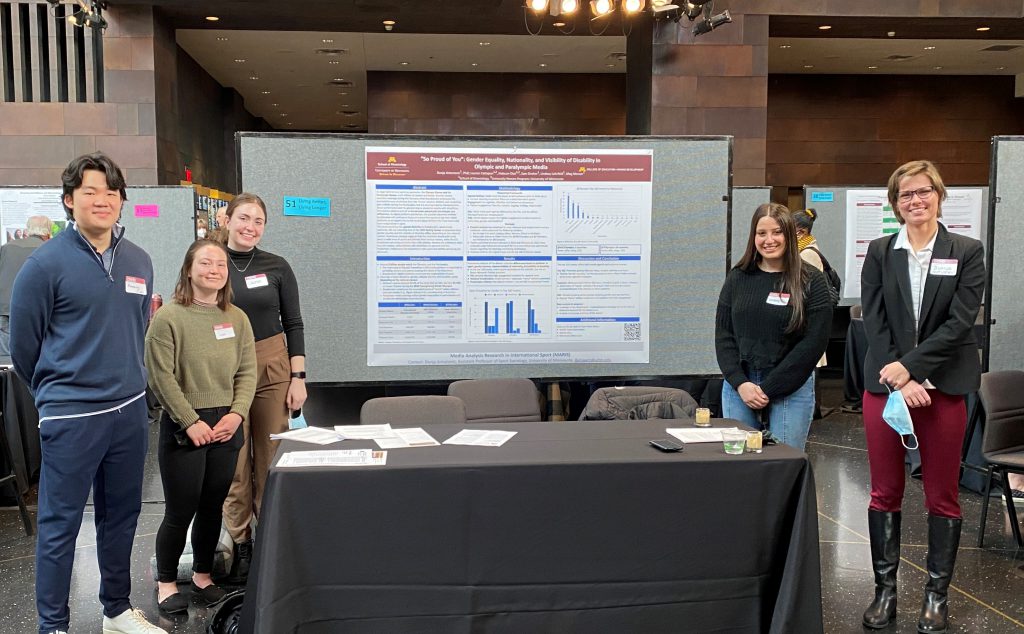
“Dunja’s scholarship empowers women through her work on their access and visibility in all areas of sport. Her recent book on feminism, media, and women’s sports is further cementing her recognition and legacy. She is an outstanding teacher, mentor and colleague who is very giving of her time and talents,” said Dr. Diane Wiese-Bjornstal, School of Kinesiology Associate Director and among the faculty members who nominated and recommended Antunovic for the award.
Antunovic joined the School of Kinesiology in fall 2020. She is also an affiliated scholar with the Tucker Center for Research on Girls & Women in Sport and the School of Kinesiology’s Honors Faculty Representative.
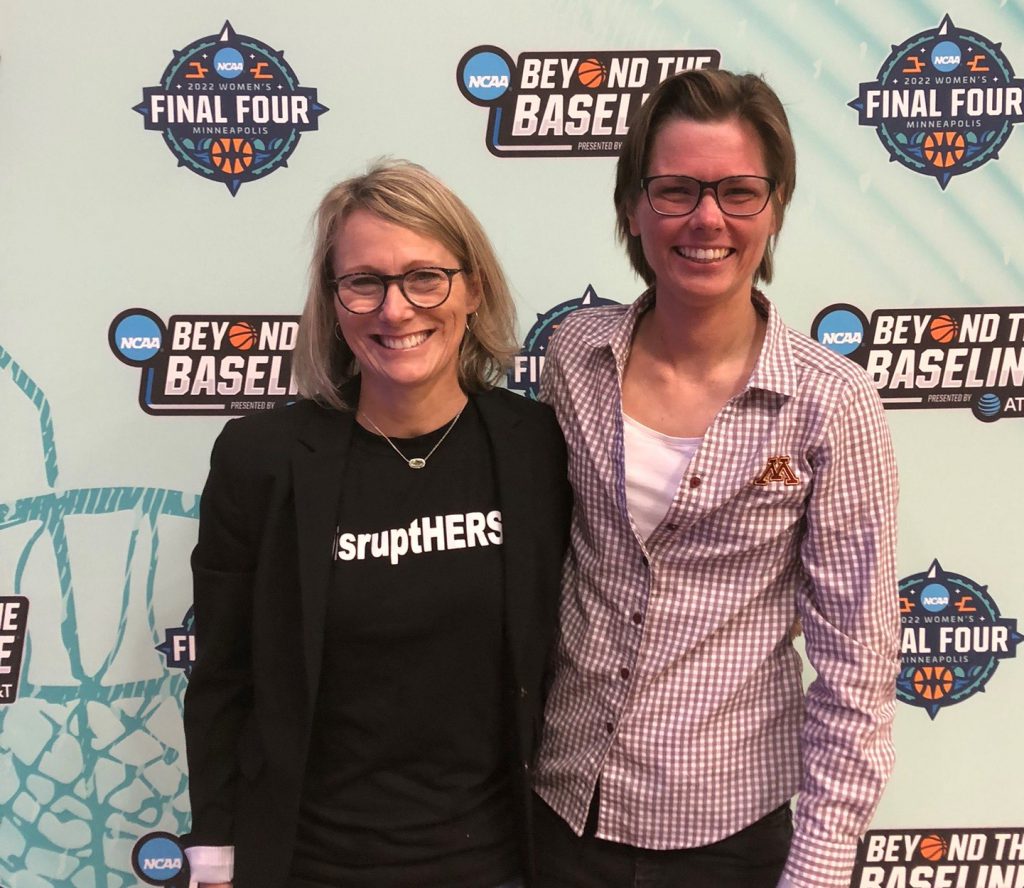
“My research examines the relationship between gender, sport, and media, including on women’s status in the media industry and representations of women’s sports,” said Antunovic of her work.
“Telling stories about women’s sports remains a primary goal of my research. Because of the continued marginalization of women’s sports in the media, telling stories entails challenging assumptions with empirical evidence and with new methodological approaches,” added Antunovic.
Antunovic recently co-authored a book with Dr. Cheryl Cooky (Purdue University), entitled Serving Equality: Feminism, Media, and Women’s Sports, among other published articles and chapters. In addition to her scholarly research, she actively mentors graduate and undergraduate students who are preparing for careers in sport, physical activity, health, and higher education.
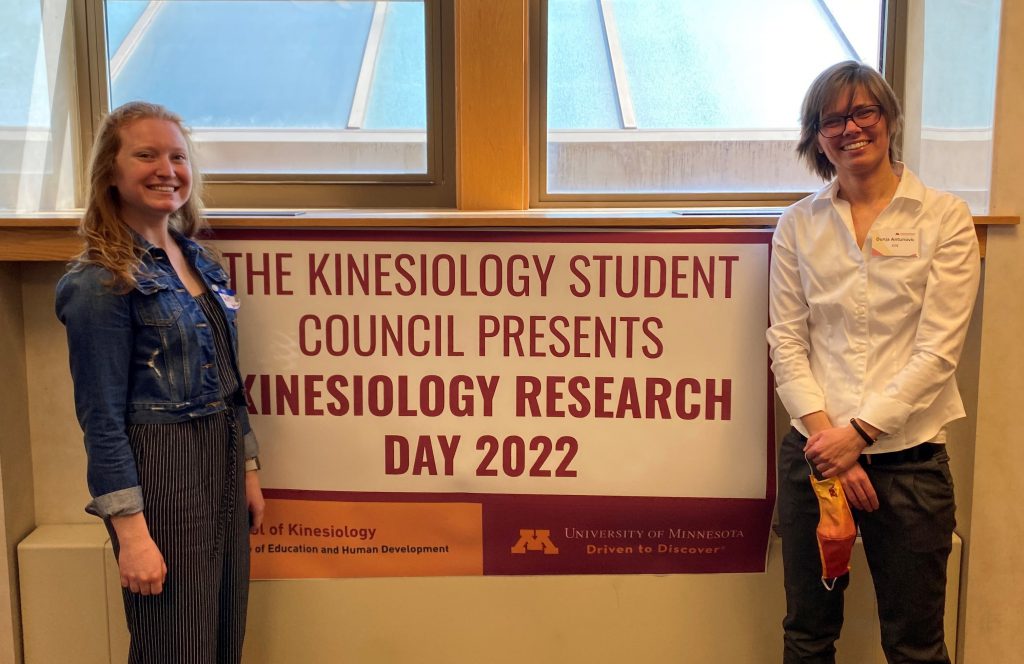
Many thanks to the Women’s Philanthropic Leadership Circle and College of Education of Human Development for this exciting recognition of Dr. Antunovic’s work, which is already spurring cultural dialog, inspiring reflection, and accelerating change.
Congratulations, Dunja!
Lewis awarded Grant-in-Aid for research on strength training intervention
Beth Lewis, PhD, professor and Director of the School of Kinesiology, has been awarded a University of Minnesota Grant-in-Aid for a pilot study set to begin this summer. Research funded through the grant will explore the efficacy of strength training intervention on exercise adherence and weight among pre-menopausal women. Weight gain is particularly common during menopause, and weight management studies addressing this type of weight gain have yielded mixed results. This pilot study will inform a future NIH grant that will propose to examine the individual and combined effect of eating and exercise interventions on weight gain prevention.
Sport management students ‘jump’ in to NCAA Women’s Final Four
The 2022 NCAA Women’s Final Four culminated Sunday in Minneapolis with the University of South Carolina triumphing over the University of Connecticut. For 30+ sport management MEd students in the School of Kinesiology, the championship game wrapped up an action-packed weekend working various Final Four-related events from Friday, April 1 to Sunday, April 3 including Tourney Town, the Coaches Convention, and the youth-focused Bounce parade.
The MEd students are enrolled in Dr. Clint Warren‘s KIN 5115: Event Management in Sport course. At the start of the semester, Warren announced that involvement in the NCAA Women’s Final Four would be central to their coursework. He also invited KIN 5115 students from 2021 to participate.
“This course teaches planning, funding and management of sporting events of all kinds, from the collegiate-level to nonprofit to community-based events,” says Warren. “The NCAA Women’s Final Four taking place locally provided a one-of-a-kind opportunity for students to obtain real boots-on-the ground experience and connect their classroom learnings to a major, national, sports event.”
Minneapolis’ selection as the NCAA Women’s Final Four host site is no coincidence. The city underwent a rigorous vetting process and was ultimately selected by the NCAA for a number of reasons, one of which is the influence of University of Minnesota women’s basketball head coach Lindsay Whalen. As reported in the New York Times, “Whalen’s story is just one of many that explain how Minneapolis, which is hosting the 2022 women’s Final Four, became one of the country’s most fervent women’s basketball communities.”
Every KIN 5115 student worked two (or more!) 4-hour shifts throughout the Women’s Final Four festivities. “I had an amazing weekend working with wonderful volunteers from Minnesota and 22 other states. I learned so much about all of the work that goes into making an event of this magnitude happen,” says MEd student Carmen Middleton. “Working in sports means long days, but getting to watch South Carolina win and the confetti fall is what it is all about!”
“This weekend was a great experience. I had so much fun helping with the Bounce, it was great getting to see 2,000 children have so much fun,” adds MEd student Laura Wagner. “It was great to see what we have been discussing in class in real life. We were lucky enough to get an inside look at the steps needed to host an event as big as the Final Four.”
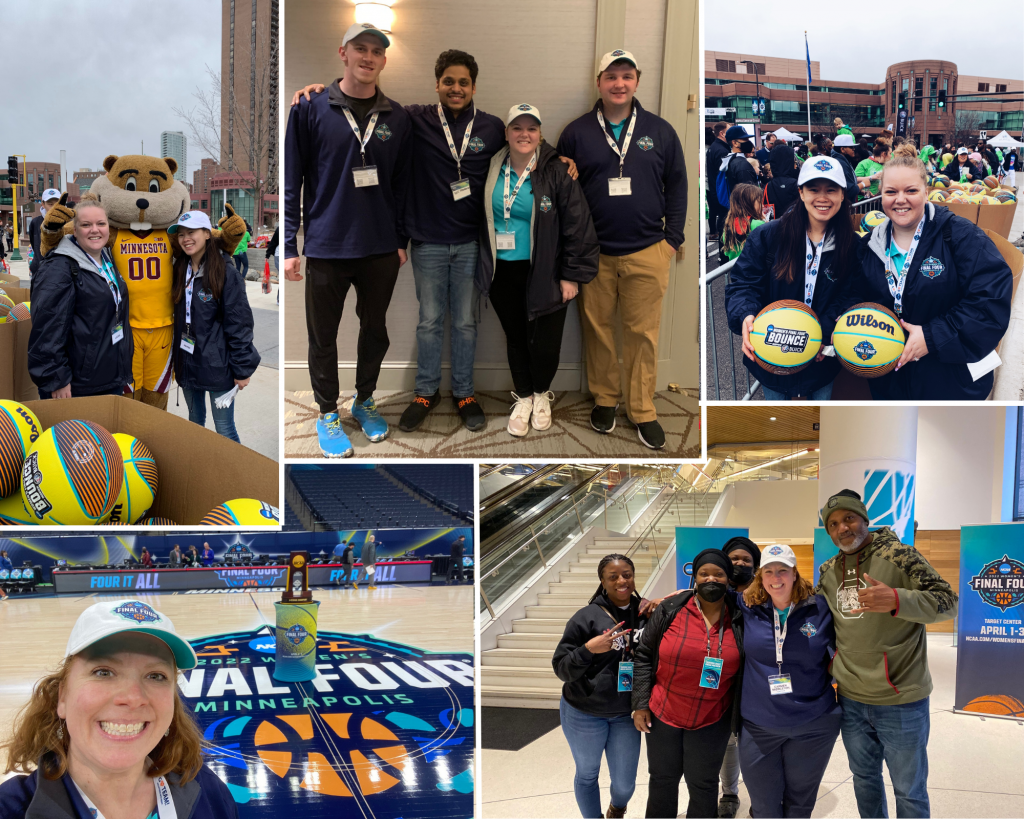
Tucker Center hosts Middle Eastern basketball coaches for seminar on girls and sport
“Coaching is a series of teachable moments,” said Dr. Nicole M. LaVoi, director of the Tucker Center for Research on Girls & Women in Sport, to a group of visiting basketball coaches from Saudi Arabia and Azerbaijan. The group, which included nearly 30, mostly female, basketball coaches, visited the 3M Arena at Mariucci on Tuesday for a workshop and Q&A session focused on coaching girls as well as barriers and opportunities surrounding girls and sport.
The group traveled from the Middle East to Minneapolis with the U.S. Department of State’s Sports Visitor Program, a sport-based exchange that builds ties between international and American athletes and coaches. They’ll also experience the Women’s NCAA Final Four basketball games during their visit.
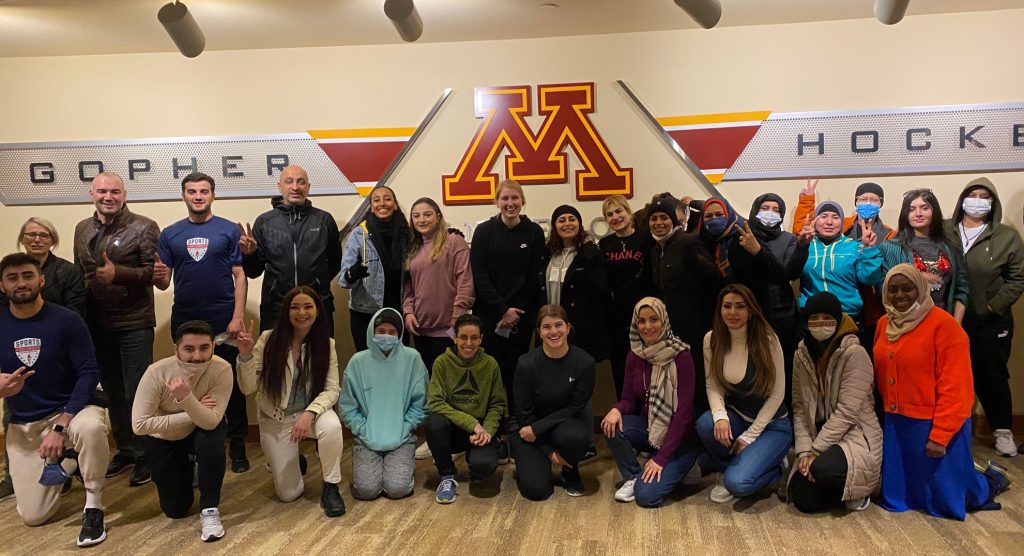
Topics of discussion included shifting cultural perceptions surrounding girls playing sports—the importance of communication and trust-building with parents, as well as the far-reaching physical and psychological benefits of sport for girls, and creating a supportive climate for girls in sports.
Tucker Center research assistants Efrat Abadi, Courtney Boucher, and Hannah Silva-Breen joined LaVoi in discussion with the international coach group, which concluded with an interactive Q&A surrounding female athletes and body image, an issue that coaches in the U.S. and abroad alike experience.
“In the Tucker Center, we try to teach girls it’s more important what your body can do, as an athlete, than what your body looks like. That’s our role as a coach, and that’s the power of sport,” said LaVoi.
Dengel talks Dexalytics, NFL Combine with KARE 11
A School of Kinesiology researcher is collaborating with the NFL to measure body composition in professional athletes during the 2022 NFL Combine in Indianapolis, IN. Donald Dengel, PhD, professor of kinesiology and director of the Laboratory of Integrative Human Physiology, was recently interviewed by Reggie Wilson of KARE 11 on the development of Dexalytics at the University of Minnesota and how the technology is being used to report on body composition of NFL athletes. As reported by KARE 11, Dexalytics “measures distribution of fat and lean mass, as well as the ratios of distribution, enabling the ability to see how athletes move their body through space.” It is currently being utilized by 12 NFL teams, up from just one team four years ago.
“In the morning, when they get up, they’ll have a report of everyone who had scans yesterday,” Dr. Dengel said. “So they can kind of look through that body composition records to decide, ‘Do I want to interview this player, or do I want to interview that player? Do we want to continue to move forward?'”
School of Kinesiology Graduate Seminar Lectures, Spring 2022
The School of Kinesiology Graduate Studies Office proudly presents the following lectures during the spring 2022 semester. Attend via the Zoom links below. Missed a lecture? Check back for past presentation recordings.
1.) What Price a Martian: Human Limits to Exploring the Red Planet
Speaker: Dr. James Pawelczyk, Penn State University
Date and Time: February 25, 2022, 2:30-3:30pm CST
Host: Dr. Christopher Lundstrom
Bio: Dr. James (Jim) Pawelczyk is an Associate Professor of Physiology, Kinesiology, and Medicine at Penn State’s College of Health and Human Development. He founded and directs the University’s novel dual-title Ph.D. program in Clinical and Translational Sciences, and has received awards for his contributions to the University’s teaching and outreach missions. Dr. Pawelczyk’s research focuses on the dynamic regulation of blood pressure, and how disuse atrophy affects blood pressure regulation. Problems with moment-to-moment regulation of blood pressure lead to orthostatic intolerance, an inability to maintain adequate blood flow to the brain that affects as many as 500,000 Americans. The condition is routinely observed following spaceflight, which Dr. Pawelczyk has studied as a NASA funded investigator for the past six years. In 1995 he was selected as a Payload Specialist for the Neurolab space shuttle mission, and flew aboard STS-90 on the space shuttle Columbia in 1998. Dr. Pawelczyk assists the formation of U.S. space life sciences strategy. He has testified before the U.S. Senate Subcommittee on Science and Space, and is an active member of the NASA Advisory Council’s Research Subcommittee for Human Exploration, the National Research Council’s Committee on Biological and Physical Sciences in Space, and the Institute of Medicine’s Committee on Aerospace Medicine and Extreme Environments.
Join Zoom Meeting
Meeting ID: 980 2529 3461
Passcode: Mv8Rq3
2.) Exercise for people living with multiple sclerosis: Improving access and targeting motor function
Speaker: Dr. Cameron Mang, University of Regina
Date and Time: March 4, 2022, 12:30-1:30pm CST
Host: Dr. Rachel Hawe
Short bio: Dr. Cameron Mang is an Assistant Professor in Kinesiology and Health Studies at the University of Regina. His research aims to improve understanding of factors that support neuroplasticity toward advances in rehabilitation for people living with motor impairment due to chronic neurological conditions. He uses techniques in electrophysiology to study how the central nervous system controls movement and the impact of neurological conditions on these processes. He also is the founder of a community exercise program (Enrich Neurorehab) for people with chronic neurological conditions. His dual role as a researcher and practicing kinesiologist/clinical exercise physiologist fosters the development of clinically meaningful research and knowledge mobilization.
Join Zoom Meeting
Meeting ID: 916 5631 5566
Passcode: MwLp6p
3.) Socioeconomic impacts of sporting events-sport participation
Speaker: Dr. Marijke Taks, Vice Dean for Research, University of Ottawa
Date and Time: March 22, 2022, 2:30-3:30pm CST
Host: Dr. Clinton Warren
Location: Akerman Hall, Minneapolis campus, room 209 (and via Zoom, please see below)
Short bio: Dr. Marijke Taks is an expert in socioeconomic aspects of sport and leisure. Her grant-supported research focuses particularly on impacts, outcomes and leveraging of small and medium sized sport events, and their meaning for host communities. She also studies sport consumer behavior of various groups in society. Mass participation and the “Sport for All” philosophy guide her research. She has published her work in leading journals of sport management and related fields. Dr. Taks is an accomplished teacher and has demonstrated her expertise as an advisor by supervising over 100 student research projects. She is past-editor of the European Sport Management Quarterly (2009-2011), associate editor of the Journal of Sport Management and the Journal of Global Sport Management, and editorial board member of the European Sport Management Quarterly, the Journal of Sport Sponsorship and Marketing, and guest reviewer for a wide variety of journals in the field of sport management, sport marketing and sport tourism.
Join Zoom Meeting
Meeting ID: 930 0608 2054
Passcode: 8vaeM3
4.) Crop tops, leggings, and midriffs, Oh My!: The activewear phenomenon and fit femininity
Speaker: Dr. Julie Brice, University of Waikato
Date and Time: April 8, 2022, 11am-12pm CST
Host: Dr. Dunja Antunovic
Speaker Bio: Dr. Julie Brice is a feminist sport sociologist currently working as a research assistant at the University of Waikato (New Zealand). She received her doctoral degree in sport sociology from the University of Waikato and her master’s in physical cultural studies from the University of Maryland. Her main research interests explore the social, cultural, and political influences that affect women’s embodied experiences of physical activity, as well as innovations within the qualitative research process. Her most recent work has focused on the activewear phenomenon, exploring the ways activewear is linked with fit femininity, societal constructions of gender, and women’s understandings of their bodies and physical activity. Alongside this, she has extensively explored the impact of new materialist theory on the qualitative research process and its application for feminist sport scholars. She is the author of numerous publications around activewear, gender, and new materialisms, and co-author of Feminist New Materialisms, Sport and Fitness: A Lively Entanglement.
Join Zoom Meeting
Meeting ID: 923 3047 4823
5.) Exploring the benefits of exercise for cognitive performance across the lifespan
Speaker: Dr. Jennifer Etnier
Date and Time: April 25, 2022, 2:30-3:30pm CST
Host: Dr. Chelsey Thul
Speaker Bio: Dr. Jennifer Etnier is the Julia Taylor Morton Distinguished Professor and Chair of the Department of Kinesiology at the University of North Carolina at Greensboro (UNCG). She received her degrees from the University of Tennessee (B.S.), University of North Carolina-Chapel Hill (M.A.), and Arizona State University (Ph.D.). Her research focuses on the effects of acute and chronic exercise for cognitive performance across the lifespan. She is currently conducting NIH R01-funded studies focused on the effects of physical activity on cognitive performance, blood-based biomarkers, and cerebral structure and function of adults with a family history of Alzheimer’s disease. Dr. Etnier is a Fellow of the National Academy of Kinesiology and American College of Sports Medicine. She served as President of the North American Society for the Psychology of Sport and Physical Activity (NASPSPA) and Editor of the Journal of Aging and Physical Activity (JAPA), Associate Editor for the Journal of Sport and Exercise Psychology (JSEP), and Section Editor for Research Quarterly for Exercise and Sport as well as an editorial board member for many other kinesiology journals.
Join Zoom Meeting
Meeting ID: 922 2434 8524
Passcode: tATWT3
Konczak publishes with German research team in Human Brain Mapping
Jürgen Konczak, Director of the Human Sensorimotor Control Laboratory in the School of Kinesiology, has published a paper entitled Motor training‐related brain reorganization in patients with cerebellar degeneration in the December 2021 edition of the scientific journal Human Brain Mapping. The cerebellum is a major neural site involved in motor control and learning. The study explored whether people with a degeneration of the cerebellum can still learn motor skills and if extra verbal and proprioceptive feedback can enhance their learning. Unfortunately, patients did not benefit from such explicit feedback. Related brain imaging data showed that cerebellar degeneration induced an increase in gray matter in the premotor cortex, which is a major target of cerebellar output. This implies that the brain reorganizes itself as neurons in the cerebellum die. The project was funded through a grant by the German Science Foundation to Drs. Dagmar Timmann and Konczak.
Chris Lundstrom, PhD, featured in New York Times story on Minnesota marathoner
Run your own race. When Minneapolis resident Annie Frisbie made her marathon debut in last month’s New York City Marathon, she did just that. As Frisbie emerged among the leaders in the race—a race that included the gold and bronze medalists in the marathon at the Tokyo Olympic Games—she pushed the competition from her mind. “I was mostly just focusing on checking in on myself and how I was feeling,” said Frisbie to the New York Times. In a story published December 5, the New York Times highlighted Frisbie and her running coach, School of Kinesiology faculty member Chris Lundstrom, PhD, who has trained and mentored her along the way.
Frisbie and Lundstrom connected when Frisbie, a River Falls, Wisconsin native, relocated to the Twin Cities to be closer to home and discovered Minnesota Distance Elite, a training group that prepares post-collegiate distance runners to compete with the best in the nation and world. Lundstrom is the group’s head coach—and, like all members of the group, holds a 9-to-5 job. Lundstrom directs the School of Kinesiology’s Sport and Exercise Science and Physical Activity and Health MEd graduate programs, a post he’s held since 2018.
Frisbie’s performance in the New York City Marathon landed her in the record books as the fourth-fastest marathon debut for an American woman, and the fourth-fastest American woman (ever) to run the New York City Marathon.
Since the race, Frisbie has been approached by companies seeking to sponsor her and agents hoping to represent her. But she and coach Lundstrom are taking this one workout, and one race, at a time. “It’s not worth spending a ton of energy on dreaming about what’s possible when you just need to do all the things, and the athlete needs to stay healthy and make progress,” Lundstrom said to the New York Times.
Hear more from Frisbie and Lundstrom (including their thoughts on training during Minnesota winters!)
Warren talks with WalletHub on ‘Good Sports Cities’
Clinton Warren, PhD, sport management lecturer in the School of Kinesiology, recently spoke with WalletHub as part of an article, 2021’s Best Sports Cities. Warren shared his thoughts on what makes a good sports city, the impact of the pandemic on the sports industry, and publicly-funded sports stadiums.
“I think it is important that a city has diverse sports offerings that reflect the diversity of the community. Cities should prioritize offerings that are rooted in the interests of the people that live there,” said Warren to WalletHub.
“Further, a good sports city prioritizes diversity and inclusion in the delivery of all sports programs,” added Warren. “Sport can be a true community asset, and while winning titles can lead to an enhanced sense of civic pride, which is secondary to the role sport can play in bringing different people together to celebrate a common cause, in my estimation.”
Dengel to offer spring course on impact of 2028 Olympics on LA
Don Dengel, PhD, exercise physiology professor in the School of Kinesiology, will offer a first-of-its-kind course in spring 2022 exploring how the 2028 Olympics stand to impact the nation’s second-largest city. KIN 4028: The Impact of the Olympic Games on Los Angeles will engage students in discussion and analysis of the history of Los Angeles and the Olympics (Los Angeles joins London, England and Paris, France as the only cities to host the summer Olympics three times), whether the 2028 Olympics will be as successful as the previous two summer Olympics the city has hosted, potential impact of the Olympics on Los Angeles and the U.S., and other questions. Part of the course includes travel to Los Angeles to visit the site of the 2028 Olympics.

